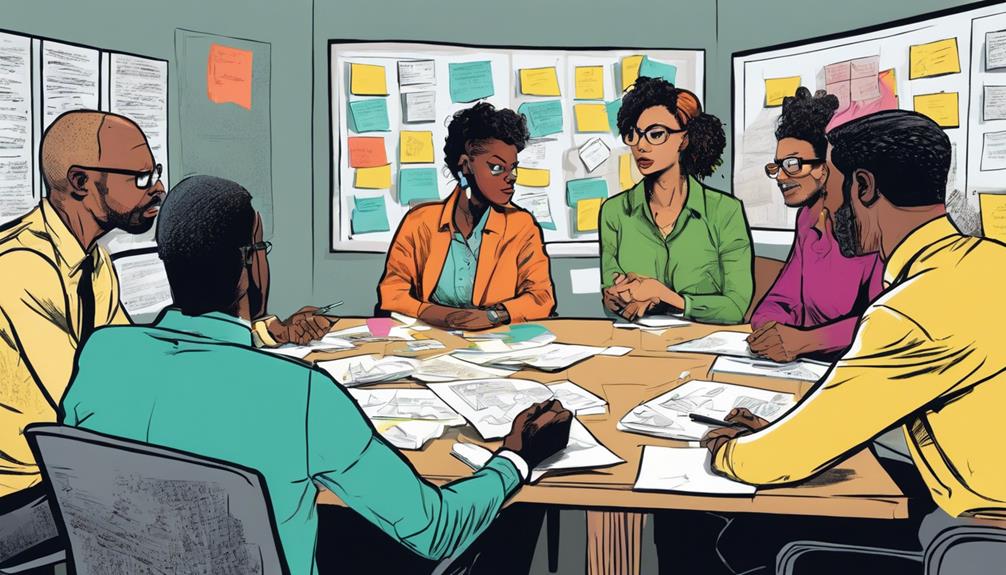Embracing conflict at work can reveal your team's full potential. By recognizing differing perspectives, you spark creativity and innovative solutions. Conflict enhances communication skills, strengthens relationships, and fosters a culture of trust and empathy among colleagues. It encourages you to engage in active listening and seek common ground, building a collaborative spirit. Leadership plays an essential role in managing conflict effectively, turning disagreements into growth opportunities. Ultimately, steering workplace conflict can lead to improved outcomes and a positive work culture. There's more to explore on how you can transform challenges into valuable insights that propel your team forward.
Key Takeaways
- Embracing conflict fosters diverse perspectives, driving creativity and innovative solutions within teams.
- Effective conflict resolution techniques, like active listening and empathy, enhance communication and strengthen professional relationships.
- Viewing disagreements as opportunities promotes organizational resilience and encourages team engagement.
- Navigating conflicts improves critical thinking and reveals hidden assumptions, leading to better problem-solving outcomes.
Understanding Workplace Conflict
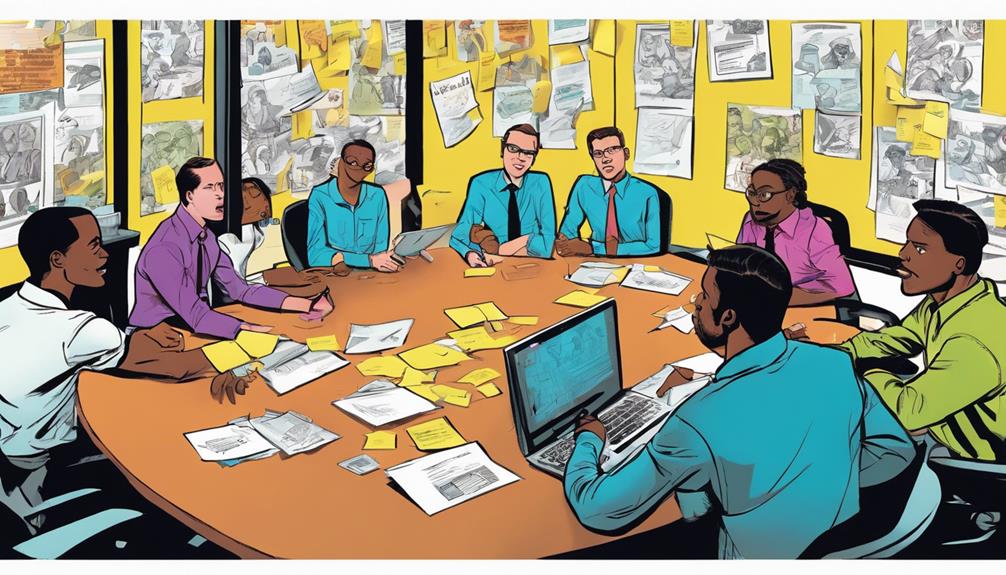
Understanding workplace conflict is essential because it not only reveals differing perspectives but also paves the way for innovative solutions and stronger professional relationships. Dealing with workplace conflict in a constructive manner can lead to a better understanding of colleagues and a more inclusive work environment. By addressing conflicts openly and honestly, we can learn from each other and grow both personally and professionally. Ultimately, learning to navigate workplace conflict may be one of the secrets to joyful living, as it allows us to cultivate empathy, resilience, and a sense of community in our professional lives.
When you encounter conflict, you get the chance to express your thoughts and needs clearly, leading to a better understanding of your colleagues. This dialogue can refine ideas and foster trust, making collaboration more effective.
Additionally, handling conflict teaches you flexibility as you adapt to various viewpoints, enhancing your communication skills. By actively listening and acknowledging different styles, you can predict responses and manage disagreements with confidence.
Embracing conflict as a learning opportunity strengthens your resilience and helps create a more open and engaged workplace culture, ultimately benefiting everyone involved.
Advantages of Embracing Disagreements
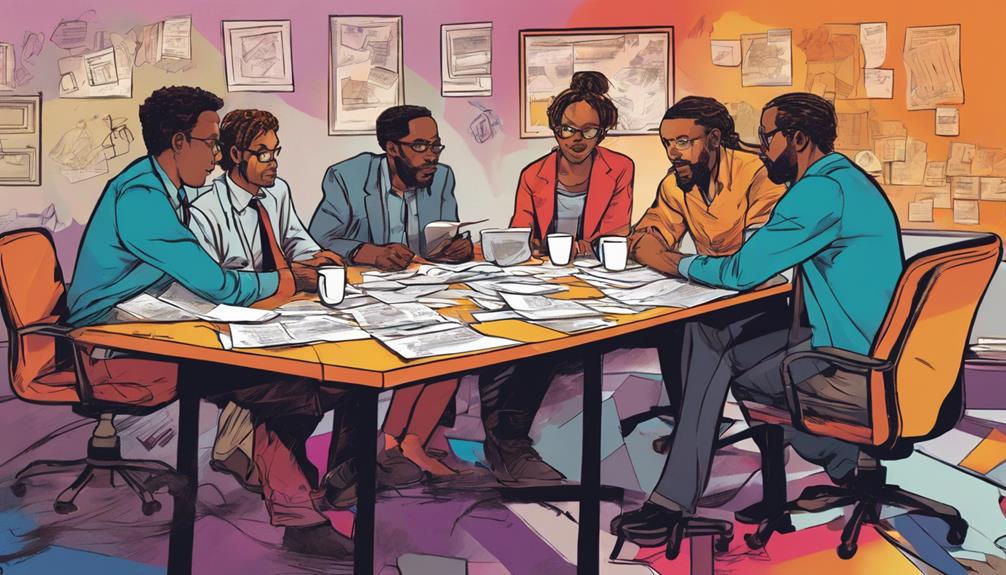
Embracing disagreements can greatly enhance collaboration by fostering a culture where diverse viewpoints lead to innovative solutions and stronger team dynamics.
When you welcome differing opinions, you open the door to new ideas, refining existing concepts and driving creativity. This approach helps you articulate your needs, ensuring everyone feels heard and valued.
Additionally, engaging in conflict teaches you flexibility, as you learn to adjust your perspective and seek common ground. It sharpens your listening skills, encouraging patience and empathy, which builds trust among colleagues.
Ultimately, embracing disagreement not only strengthens relationships but also equips you with the tools to navigate challenges more effectively, creating a more resilient and dynamic workplace environment.
Conflict Resolution Techniques

Effective conflict resolution techniques empower you to navigate disagreements and foster a collaborative workplace environment. To effectively resolve conflicts, consider these techniques:
| Technique | Description |
|---|---|
| Active Listening | Focus on understanding the other person's perspective without interrupting. |
| Empathy | Acknowledge emotions involved to build rapport and trust. |
| Problem-Solving | Collaboratively identify solutions that satisfy all parties involved. |
| Compromise | Find a middle ground where both sides can agree to disagree. |
| Mediation | Involve a neutral third party to facilitate a constructive discussion. |
The Role of Communication
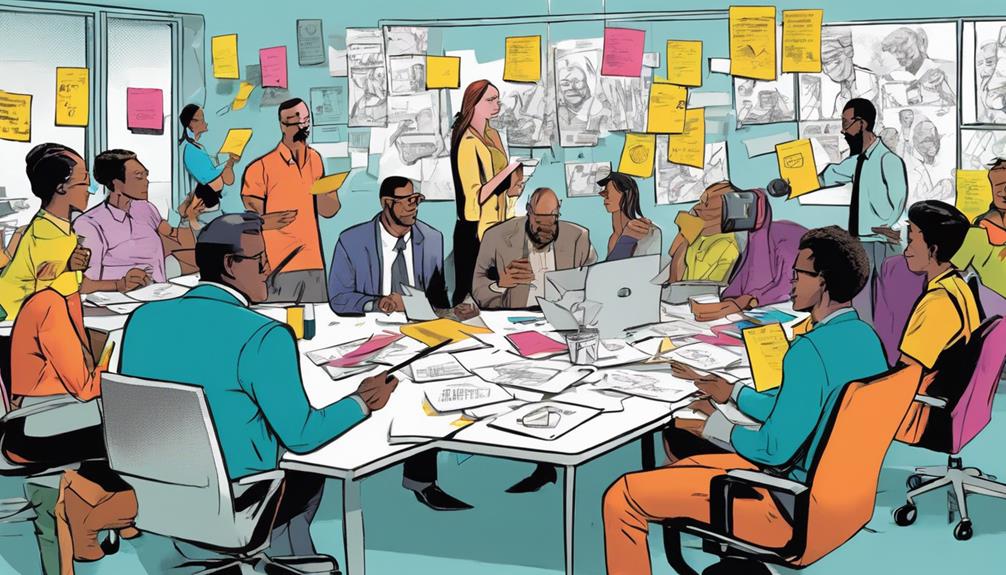
Communication plays an essential role in resolving conflicts and fostering collaboration among team members. When you engage openly, it not only helps clarify misunderstandings but also encourages a cooperative atmosphere. By actively listening and expressing your thoughts, you can transform potential disputes into opportunities for growth.
Here are three key aspects to reflect upon:
- Clarity: Clear communication minimizes confusion, ensuring everyone understands their roles and responsibilities.
- Empathy: Acknowledging others' feelings fosters a supportive environment where all voices are valued.
- Feedback: Constructive feedback promotes continuous improvement, allowing team members to learn from each interaction.
Building Trust Through Conflict

Conflict can actually be a powerful tool for building trust, as it encourages open dialogue and deeper understanding among team members.
When you engage in constructive conflict, you create a safe space for everyone to express their thoughts and feelings. This openness fosters empathy, allowing you to appreciate different perspectives.
By addressing disagreements head-on, you demonstrate vulnerability, which can strengthen relationships. Additionally, active listening during these discussions shows your commitment to understanding others, enhancing mutual respect.
As you navigate conflicts together, you'll build a sense of camaraderie, making it easier to tackle future challenges.
Embracing conflict, rather than avoiding it, ultimately sets the foundation for a more cohesive and trustworthy team environment.
Encouraging Diverse Perspectives

Embracing diverse perspectives not only enriches discussions but also sparks innovative solutions that can transform your workplace. By encouraging different viewpoints, you create an environment where creativity thrives and collaboration flourishes.
Here's how you can foster this diversity:
- Invite Open Dialogue: Encourage team members to share their thoughts without fear of judgement, creating a safe space for ideas.
- Celebrate Differences: Recognize and appreciate individual backgrounds and experiences, which can lead to unique insights and approaches.
- Facilitate Collaborative Projects: Pair individuals from various departments to tackle challenges, allowing diverse skill sets and perspectives to merge.
Leadership and Conflict Dynamics
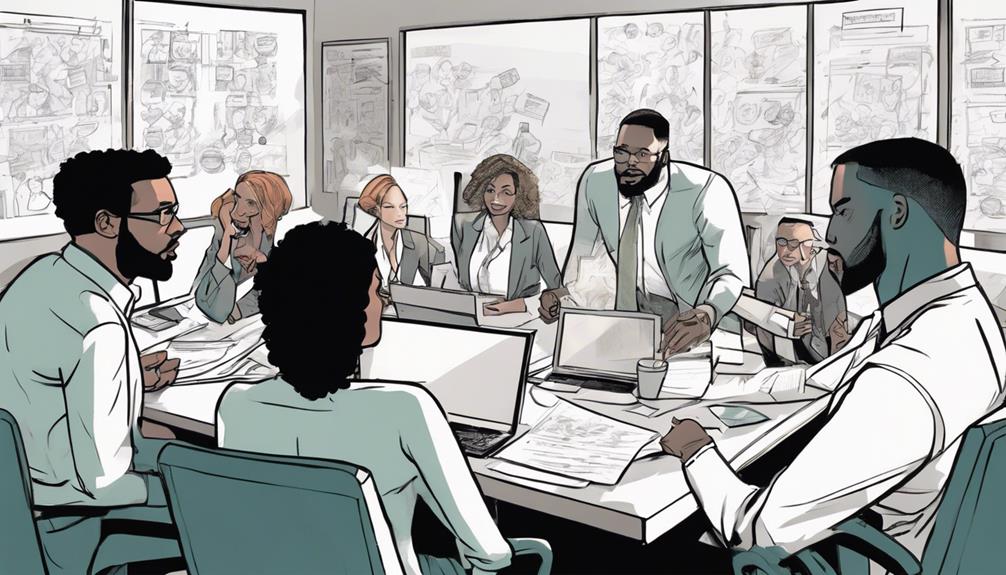
Fostering diverse perspectives lays the groundwork for effective leadership, especially when steering through the complexities of conflict dynamics in the workplace.
As a leader, you need to embrace conflict as a tool for growth and innovation. When disagreements arise, view them as opportunities to engage with your team, allowing various viewpoints to surface. This not only deepens trust but also enhances collaboration.
You'll find that maneuvering through these tensions requires patience and active listening, essential skills for any effective leader. By modeling emotional control and open communication, you'll encourage your team to express their needs and concerns.
Ultimately, your ability to manage conflict dynamically will drive your organization toward greater resilience and success.
Fostering a Positive Culture

Cultivating a positive workplace culture starts with prioritizing open communication and mutual respect among team members. When you foster an environment where everyone feels valued, you reveal potential for creativity and collaboration.
Here are three key practices to enhance your workplace culture:
- Regular Check-Ins: Schedule consistent one-on-one meetings to discuss concerns and celebrate achievements, making team members feel heard and appreciated.
- Team-Building Activities: Organize fun, engaging activities that allow employees to bond, breaking down barriers and strengthening relationships.
- Recognition Programs: Implement a system for recognizing individual and team contributions, reinforcing the idea that everyone's efforts matter.
Navigating Emotional Responses
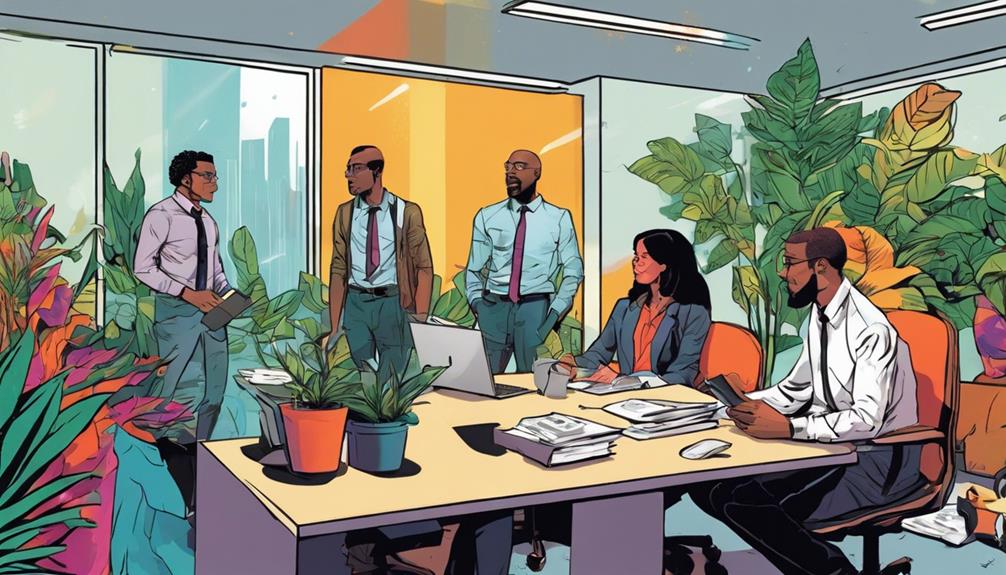
Creating a positive workplace culture sets the stage for effectively guiding emotional responses during conflicts.
When you encounter disagreements, acknowledge your feelings and those of others. This awareness helps you respond thoughtfully rather than react impulsively.
Practice active listening; it not only shows respect but also calms tense situations. By validating emotions, you foster an environment where people feel safe to express their views.
Remember, it's okay to pause and collect your thoughts before responding. This practice can prevent escalation and lead to more productive discussions.
Embracing vulnerability can build trust among team members, making it easier to navigate the emotional landscape of conflict.
Ultimately, managing emotions well turns challenges into opportunities for growth and collaboration.
Transforming Conflict Into Innovation

Conflict can spark innovative ideas by challenging conventional thinking and encouraging diverse perspectives to emerge. When you embrace conflict, you release the potential for creativity and fresh solutions.
Here are three ways conflict can fuel innovation:
- Diverse Ideas: Engaging in conflict brings different viewpoints to the table, leading to creative brainstorming sessions.
- Enhanced Problem-Solving: As you navigate disagreements, you're forced to rethink approaches, refining your strategies and discovering better methods.
- Collaborative Synergy: Working through conflict fosters teamwork, allowing colleagues to combine their strengths to generate unique solutions.
Conclusion
Just like a sculptor chisels away at marble to reveal a masterpiece, you can shape conflict into a tool for growth.
Embracing disagreements not only refines your ideas but also carves out new pathways for collaboration and innovation.
As you navigate these challenges, remember that each conflict is a stepping stone toward a more engaged and productive workplace.
So, don't shy away—embrace the discord, and watch as it transforms your team into a dynamic force for creativity.
